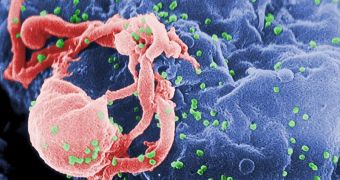A group of investigators with the Gladstone Institutes, a biomedical research organization affiliated with the University of California in San Francisco (UCSF), recently found out how the human immunodeficiency virus (HIV) kills immune system cells whose death is necessary in order for AIDS to develop.
AIDS, of the acquired immunodeficiency syndrome, cannot emerge in the human body unless immune system cells called CD4 T cells are destroyed. In the new study, the research team was able to discover and highlight the molecular chain of events that HIV triggers in order to kill these defense cells.
By blocking this cascade of processes, researchers may soon become able of stopping AIDS from appearing in patients who are infected with HIV. An existing anti-inflammatory drug was shown in recent lab trials to be very effective at stopping these processes, and neutralizing the actions of HIV.
A Phase 2 clinical trial is already being planned for this chemical. Researchers are interested to learn if other chemicals in its class have a similar effect on the dreaded virus. Additionally, the tests will reveal whether or not the protective effects extends to conditions related to AIDS, Science Daily reports.
Details of the new research were published in two separate papers, which appeared in the December 19 issues of the top scientific journal Nature and Science, respectively. The work was led by virologist and immunologist Warner C. Greene, MD, PhD, the director of immunology research at GI.
“Gladstone has made two important discoveries, first by showing how the body's own immune response to HIV causes CD4 T cell death via a pathway triggering inflammation, and secondly by identifying the host DNA sensor that detects the viral DNA and triggers this death response,” comments Robert F. Siliciano, MD, PhD.
“This one-two punch of discoveries underscores the critical value of basic science – by uncovering the major cause of CD4 T cell depletion in AIDS, Dr. Greene's lab has been able to identify a potential new therapy for blocking the disease's progression and improving on current antiretroviral medications,” he adds.
Siliciano, who was not involved with the new study, holds joint appointments as a professor of medicine at the Johns Hopkins University, and as a Howard Hughes Medical Institute investigator.
“This has been an absolutely fascinating voyage of discovery. Every time we turned over an 'experimental rock' in the studies, a new surprise jumped out,” Dr. Greene concludes.

 14 DAY TRIAL //
14 DAY TRIAL //